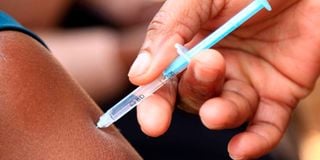Kenya lagging behind in Covid-19 vaccinations, report shows

A health worker administers Covid-19 vaccine on September 20, 2021.
What you need to know:
- Kenya, which has a target of jabbing 10 million people by Christmas Day, has fully vaccinated only 10 percent of the population.
- To push vaccinations, the government has since announced plans to deny services to the unvaccinated.
Kenya is among countries lagging behind in Covid-19 vaccinations in Africa, a new report shows.
Nairobi, according to the report by Mo Ibrahim Foundation, will not hit the World Health Organisation (WHO) 2021 year-end target of fully vaccinating 40 percent of the population.
Only five countries will likely hit the target on the continent that has so far fully inoculated a paltry 6.8 percent of its population.
Seychelles, Mauritius and Morocco, have already met the goal with Tunisia and Cabo Verde, projected to hit the target before December 31.
Kenya, which has a local target of jabbing 10 million people by Christmas Day, has fully vaccinated only 10 percent of the population.
“Since the start of the pandemic in Kenya, at least 462 people out of every 100,000 have had Covid-19, while at least nine people per 100,000 have died with the virus,” the report states.
The main reason why Kenya and the majority of the African nations will fail to hit the target, according to the report, is the fact that Africa accounts for 25 per cent of global vaccine demand but relies on imports for 99 per cent of its routine vaccine needs.
Denied government services
Another factor is that only 10 local vaccine value chain players currently operate in Africa— mostly in downstream steps which include fill and finish, packaging and labelling, import to distribute.
The 10 local vaccine value chain players are located in Nigeria (2), South Africa (2), Algeria (1), Egypt (1), Ethiopia (1), Morocco (1), Senegal, (1) and Tunisia (1).
The WHO states that Africa needs to vaccinate 70 percent of its population by the end of 2022 to have a chance of controlling Covid-19 pandemic yet it only accounts for 2.9 percent of the 7.6 billion vaccines administered globally.
The race to hit the target has prompted the government to declare that Kenyans without proof of vaccination will be denied government services in the new year.
Health Cabinet Secretary Mutahi Kagwe said everyone seeking government services must be fully vaccinated to keep infection rates low and avoid lockdowns, which triggered layoffs and contraction of the economy last year.
When Mr Kagwe made the announcement on November 20th, there were 6,388,427 vaccines administered. However, ten days after his announcement the number has shot up to 7,175,590.
Vaccine outreach programmes
Kenya has made several adjustments to hit the target, including reviewing the initial vaccination plan to address distribution challenges encountered, especially in the North.
The ministry is also collaborating with organisations such as the Kenya Red Cross, who will be enlisted to help with vaccine outreach programmes.
According to the National Covid-19 Vaccine Deployment Plan, Kenya will in the second and third phases vaccinate 26 million people over the next 12 months.
So far, Nairobi County is in the lead with 28.6 per cent of the population fully vaccinated followed by Nyeri 23.0 per cent, Kiambu 17.4 percent, Laikipia 16.4 percent, Taita Taveta 13.8 percent and Murang’a 13.4 percent.
Other top counties are Uasin Gishu 13.1 percent, Nyandarua 12.3 percent, Kirinyaga 12.2 percent, Kisumu 11.9 percent, Nakuru 11.8 percent, Kajiado 11.5 percent, and Mombasa 11.4 percent.
Additionally, the Mo Ibrahim Foundation report states that when it comes to healthcare, Kenya ranks 14th in the indicator Access to Healthcare.
Kenya scores better in 2019 compared to 2010, with major improvements being recorded since 2015.





